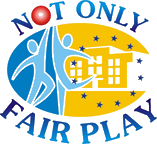
- Home
- Best
Practices - Toolkits
How to ... - Sport
Events - Guidelines
- Information
& Contacts - Project Management
A collection of student stories and initiatives about sport.
This section offers access to a collection of toolkits to promote sport at school.
-
 Physical Education Teachers
They are the main point of reference for students at school
Physical Education Teachers
They are the main point of reference for students at school
-
 Teachers
Teachers of all subjects can contribute to promote sport at school
Teachers
Teachers of all subjects can contribute to promote sport at school
-
 School Directors
Their support is a key element to promote sport at school
School Directors
Their support is a key element to promote sport at school
-
 Resources
A database of resources for teachers, PE teachers and school directors for the promotion of sport at school.
Resources
A database of resources for teachers, PE teachers and school directors for the promotion of sport at school.
Sporting events are organised in each partner country
Guidelines for policy makers willing to raise awareness on the importance of promoting sport in schools
Events
The Not Only Fair Play project has been promoted through conferences and articles.
Partnership
-
 Contractual Partners
From this section it is possible to access a description of each contractual partner of the Not Only Fair Play project.
Contractual Partners
From this section it is possible to access a description of each contractual partner of the Not Only Fair Play project.
-
 Schools
From this section it is possible to access information about the schools involved in the Not Only Fair Play Project in the 9 European countries involved.
Schools
From this section it is possible to access information about the schools involved in the Not Only Fair Play Project in the 9 European countries involved.
-
 Associated Partners
A number of associated partners officially joined the project in order to ensure the project sustainability by continuing to use the project deliverables over the next years.
Associated Partners
A number of associated partners officially joined the project in order to ensure the project sustainability by continuing to use the project deliverables over the next years.
This section of the Not Only Fair Play portal provides administrative information for the project contractual partners and for the European Commission, and is password protected.
School Directors
Homepage > Toolkits > School Directors

Their support is a key element to promote sport at school
Back to the School Directors Toolkits
Sport as a Mean of Social Inclusion
A Toolkit for School Director
Sport as a mean of social inclusion is a powerful tool when it is used across the curriculum and not only by the P.E. teacher – as so often is the case. Sport as a mean of social inclusion needs to come out of the gym and enter the classroom, it has to involve everyone and become a shared value of the school.
School Directors play the key-role in creating the conditions that can bring change to a school in order to reach this goal. They can also be the mediator between students and parents.
Our work has been carried out through a mixed method based on observation and interviews: observation of what is happening in the most Italian and French schools in recent years and interviews with experienced teachers to listen to their points of view and suggestions. Our observation goes beyond Europe because we tried to understand what was also happening in the United States, for example, as sport has always been and still is very important in the school curriculum.
After that, we have collected the main ideas in the steps described below.
Aims:
• Examine good practices
• Make suggestions for improvement in adopting inclusive practices.


